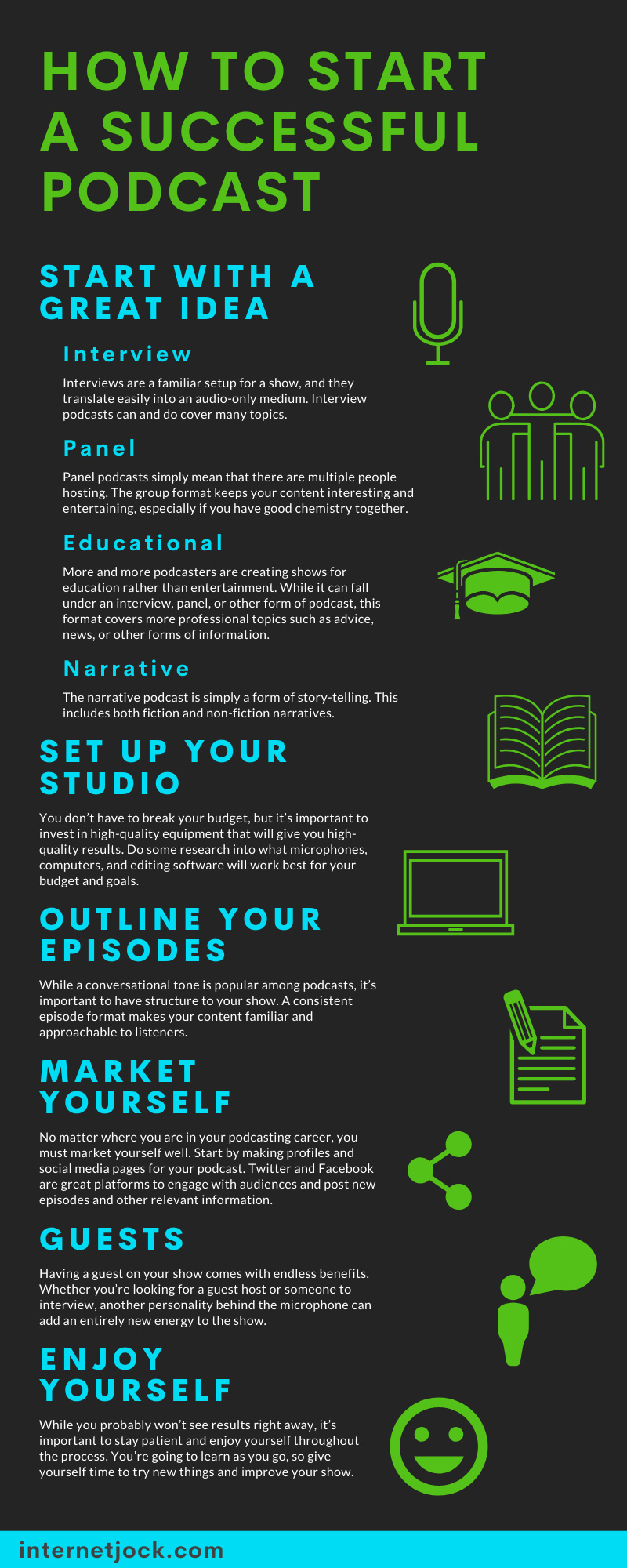
How to Start a Successful Podcast
The podcast is a rapidly expanding platform. More and more people are regularly tuning into their favorite podcasts during their daily commute or in their free time. With platforms such as Spotify and Apple Podcasts, it’s easier than ever for anyone to create and launch their own podcast series. However, while it’s easy enough to record and upload an audio file, there’s a lot more that goes into a starting a podcast. If you plan to launch a well-crafted, popular series, check out this guide for how to start a successful podcast.
Start with a Great Idea
First things first: you need an idea. No two podcasts are alike, but it’s important to know what makes yours stand out among the rest. Find out what you want to do, as well as why it matters. What message do you want to send, and why do you want to send it? Know who your target audience is and what you want them to get out of every episode. This will help you figure out what you need to do in order to gain that audience and keep them as loyal listeners. Of course, your target audience will depend on the type of podcast you have. Here are a few different formats your podcast might fall under:
Interview
The interview podcast is a simple yet extremely popular format. Interviews are a familiar setup for a show, and they translate easily into an audio-only medium. Interview podcasts can and do cover many topics. From bona fide celebrities to professionals in a certain field, you can host pretty much anyone you want on your podcast.
Panel
Panel podcasts simply mean that there are multiple people hosting. The group format keeps your content interesting and entertaining, especially if you have good chemistry together. Again, panel podcasts can cover a wide range of content and genres. It’s a particularly popular format for comedy or other shows with a more casual tone.
Educational
More and more podcasters are creating shows for education rather than entertainment. This is the educational podcast. While it can fall under an interview, panel, or other form of podcast, this format covers more professional topics such as advice, news, or other forms of information. Businesses often use educational podcasts to teach their target audience more about their industry. These can also be used for advertising, product reviews, and other marketing purposes.
Narrative
The narrative podcast is simply a form of story-telling. This includes both fiction and non-fiction narratives. These narratives can take place over a single show, or they can be episodic and released in installments like a television series.
Set Up Your Studio
Most headphones and laptops come with microphones, but that doesn’t mean you’re going to get a quality recording out of them. You don’t have to break your budget, but it’s important to invest in high-quality equipment that will give you high-quality results. Do some research into what microphones, computers, and editing software will work best for your budget and goals. It’s also important to have a place set aside as a studio. Having a permanent setup—even if it’s just a quiet room in your home—will make recording sessions much easier.
Outline Your Episodes
While a conversational tone is popular among podcasts, it’s important to have structure to your show. A consistent episode format makes your content familiar and approachable to listeners. It also lets you put your own spin on each episode. What kind of intro and outro do you want? Will you use music or sound effects? Do you have specific segments every episode, or are you comfortable freestyling? Once you’ve made these decisions, consider how you want to implement them.
Multiple voices can make a show more interesting. It also helps you sound more polished and professional. Consider hiring a professional voice over actor to record your intro or outro. You can also look at commercial voice over services to help you record advertisements or other sponsored segments in your podcast. No matter what you end up doing, remember that consistency is key to making successful episodes.
Market Yourself
No matter where you are in your podcasting career, you must market yourself well. Start by making profiles and social media pages for your podcast. Twitter and Facebook are great platforms to engage with audiences and post new episodes and other relevant information. Set up a business email as well. Put links to your email and social media profiles in every episode description so it’s easy for listeners to find. Finally, once you’ve gained a following, consider monetizing your podcast. Find businesses and other sponsors who will pay to have their products or services advertised in your episodes. When looking for sponsors, it’s best to find a company that aligns with your content and target audience.
Guests
Having a guest on your show comes with endless benefits. Whether you’re looking for a guest host or someone to interview, another personality behind the microphone can add an entirely new energy to the show. Guests are also a great way to market yourself. When someone appears on their show, they bring new audience members with them. By collaborating with other creators, you share audiences and help bring your content to new ears, potentially gaining new followers along the way.
Enjoy Yourself
It might take a while to gain a following and get your podcast off the ground. You’re going to learn as you go, so give yourself time to try new things and improve your show. While you probably won’t see results right away, it’s important to stay patient and enjoy yourself throughout the process. If you’re not having fun while doing it, what’s the point? The biggest tip for how to start a successful podcast is to simply have fun. Create content that you want to listen to. Work with people you get along with and respect. If you’re passionate about the process, then the time, money, and energy you put into it will be worth it.
